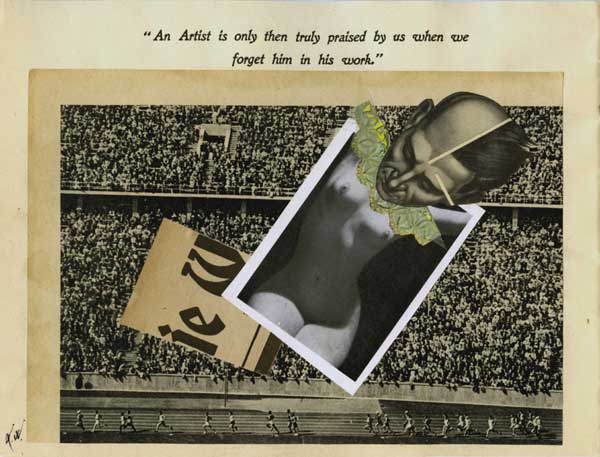 |
Title
 По-настоящему художника хвалят только тогда, когда при виде его творения забывают о нем самом.
По-настоящему художника хвалят только тогда, когда при виде его творения забывают о нем самом. Wenn Wir über Das Kunstwerk Den Künstler Vergessen Können, Damit Ist Dieser Am Feinsten Gelobt.
Wenn Wir über Das Kunstwerk Den Künstler Vergessen Können, Damit Ist Dieser Am Feinsten Gelobt. Un Artiste Est Vraiment Valorisé Quand Nous L'oublions Dans Son Travail.
Un Artiste Est Vraiment Valorisé Quand Nous L'oublions Dans Son Travail. An Artist Is Only Then Truly Praised By Us When We Forget Him In His Work
An Artist Is Only Then Truly Praised By Us When We Forget Him In His WorkSituation: Karl Waldmann Museum, Belgium
Subject
| The background is a picture of an Olympic stadium. A picture of a naked woman with the head of a male mannequin is stuck on it. "Wenn wir über das Kunstwerk den Künstler vergessen können, damit ist dieser am feinsten gelobt." "An artist is only then truly praised by us when we forget him in his work". Gotthold Ephraim Lessing, (1729 - 1781), Germain writer, philosopher of the Enlightenment. This quotation comes from the play "Emilia Galotti" (1772) by Gotthold Ephraim Lessing (1729-1781). It is said by Prince Hettore Gonzaga de Guastalla, who criticizes the painter Conti because he embellished the physical appearance of his models. The tragedy "Emilia Galotti"deals with the opposition between the nobility (portrayed by the absolutist Prince Hettore Gonzaga) and the new enlightened bourgeoisie (the Galotti family). |
| Le fond est une photo d'un stade olympique. Une photo d'une femme nue qui a une tête de mannequin homme est collée dessus. "Wenn wir über das Kunstwerk den Künstler vergessen können, damit ist dieser am feinsten gelobt." "Un artiste est vraiment valorisé quand nous l'oublions dans son travail." Gotthold Ephraim Lessing, (1729 - 1781), écrivain allemand, philosophe des Lumières. La citation est tirée de la pièce de théâtre "Emilia Galotti" (1772) de Gotthold Ephraim Lessing (1729-1781). La phrase est énoncé par le prince Hettore Gonzaga de Guastalla afin de critiquer le peintre Conti pour avoir embelli l'apparence extérieure de ses modèles. La tragédie "Emilia Galotti" traite de l'opposition entre la noblesse (incarné par le prince absolutiste Hettore Gonzaga) et la nouvelle bourgeoisie éclairée (la famille Galotti). |
Web Link
Backside of the work
 |